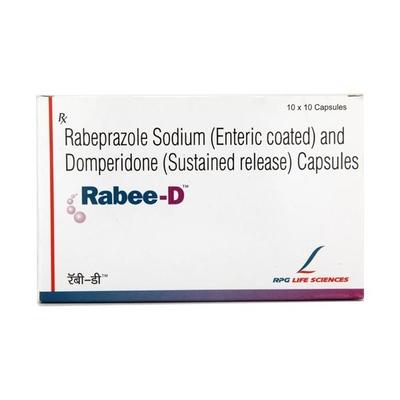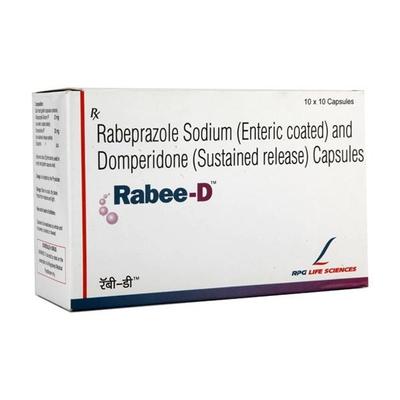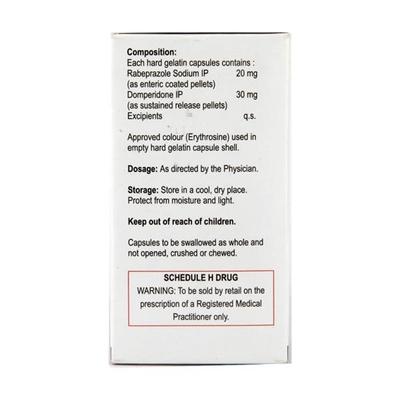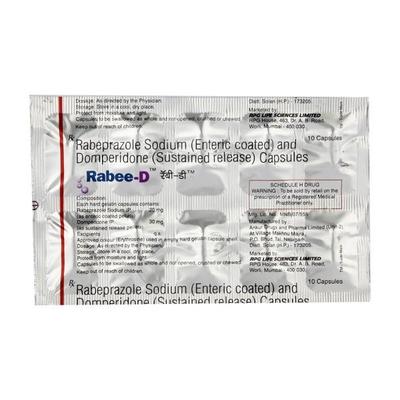

Netmeds First Membership
Quick Links
Introduction About RABEE D CAPSULE
RABEE D CAPSULE is a dual-action formulation designed to support stomach comfort and digestive balance. It contains Rabeprazole and Domperidone, two clinically studied components that reduce excessive stomach acid and support smoother digestion. This combination is widely recommended for individuals experiencing symptoms linked to acidity, heartburn, or discomfort after meals.
Along management with RABEE D CAPSULE , try to eat less spicy foods and drink plenty of water. Avoid smoking or alcohol consumption as it may aggravate your existing condition. Patients receiving long-term management with the medicine should be kept on regular surveillance to rule out the risk of hypomagnesaemia (decreased magnesium levels in blood) and bone fracture, predominantly in the elderly patients and in patients with other recognized risk factors.
Some individuals may experience mild effects such as headache, dry mouth, abdominal discomfort, constipation, dizziness, or nausea. These effects are generally temporary. If they persist, contact your healthcare provider for guidance.
Store RABEE D CAPSULE in a cool, dry place away from direct sunlight and moisture. Keep out of reach of children and pets.
Key Composition
- Rabeprazole (20 mg): Helps control the acid produced in the stomach by selectively acting on proton pumps
- Domperidone (30 mg): Aids in faster stomach emptying and minimizes sensations of nausea or bloating
Uses Of RABEE D CAPSULE
- Used to support stomach comfort and digestive balance
Benefits of RABEE D CAPSULE
- Supports long-lasting relief from acid-related discomfort
- Improves digestive motility and helps manage fullness or heaviness after eating
- Promotes digestive comfort by neutralising excess gastric acid
- Enhances daily comfort for individuals with frequent acidity or reflux symptoms
How RABEE D CAPSULE Works
RABEE D CAPSULE works through a dual mechanism. Rabeprazole acts by reducing acid secretion at its source, ensuring a well-balanced gastric environment. Meanwhile, Domperidone restores the normal movement of the stomach and intestines, managing acid backflow and improving food passage for a more comfortable digestive experience.
Dual Mechanism Explained: Acid Control and Gut Movement
1. Acid Control through Rabeprazole:
Rabeprazole belongs to the class of proton pump modulators that reduce acid secretion at its source. Once absorbed in the intestine, it reaches the acid-producing parietal cells in the stomach lining. Here, it selectively and irreversibly binds to the H/K ATPase enzyme system, also known as the proton pump, the final step in acid secretion. By blocking the hydrogen ion exchange process, Rabeprazole manages excessive acid release into the stomach lumen, thereby increasing gastric pH. It acts faster than many other molecules in its class due to its ability to activate at higher pH levels, efficiently reducing acid production even at minimal acidity. This long-acting acid suppression helps relieve common signs of acidity and promotes a stable digestive environment.
2. Gut Movement through Domperidone:
Domperidone supports the mechanical side of digestion by enhancing gastric motility. It selectively blocks dopamine D2 receptors found in the upper gastrointestinal tract, which normally act to slow stomach contractions. By inhibiting these receptors, Domperidone increases the tone of the lower esophageal sphincter (LES), facilitates faster gastric emptying, and decreases the backward flow of food and acid into the esophagus. It also improves intestinal motion, reducing sensations of bloating, heaviness, or delayed digestion after meals, particularly useful for individuals who experience reflux linked to slow gastric transit.
3. Integrated Digestive Action:
Together, these two mechanisms form a dual-action system. Rabeprazole ensures acid stability, while Domperidone optimizes movement and clearance. This combination supports digestive comfort by minimizing acid build-up while promoting efficient passage of food through the stomach and intestines. It is particularly suited for individuals who face recurring symptoms like heartburn, acid reflux, or post-meal fullness due to poor gastric motility or high acid output. This science-backed synergy makes RABEE D CAPSULE effective for holistic digestive maintenance under medical supervision.
“Quick Fact Highlights” explaining why the dual combination is clinically valued
- Clinically synergistic formulation: The combination of Rabeprazole (20 mg) and Domperidone (30 mg SR) works through a dual mechanism, controlling stomach acid while improving gut motility providing faster and more comprehensive relief from acid discomfort
- Science-backed acid regulation: Rabeprazole acts at the final step of acid production by blocking the H/K ATPase enzyme, also known as the proton pump. This action significantly reduces acid secretion and maintains optimal pH levels in the stomach for prolonged comfort
- Enhanced digestion support: Domperidone increases the movement of the stomach and upper intestinal tract, promoting quicker stomach emptying and minimizing post-meal bloating, nausea, and reflux symptoms
- Faster symptom control: Rabeprazole has one of the quickest onset times among proton pump inhibitors, beginning to act within 1 hour of ingestion, offering prompt relief in cases of severe acidity and heartburn
- Persistent gastric balance: The sustained-release form of Domperidone maintains smooth motility throughout the day, managing the recurrence of reflux episodes and late-night acidity, a key benefit for individuals with night-time acid reflux or delayed digestion
- Improved patient quality of life: This dual approach relieves not just acid discomfort but also digestive sluggishness, making it beneficial for individuals who experience post-meal heaviness, belching, or regurgitation along with acidity
- Clinically preferred for complex acid disorders: Physicians often recommend this combination when single-drug therapy (acid suppressants alone) fails to improve acid-related conditions or reflux-associated nausea
- Well-tolerated and safety-monitored: The formulation has a proven safety profile when used as prescribed, with side effects such as mild headache or dizziness typically resolving with continued use
How to use RABEE D CAPSULE
Take the capsule before meals, preferably in the morning, or as directed by your healthcare provider. Swallow the capsule whole with water without crushing or chewing. Regular use under professional guidance ensures optimal results.
1. How to Take RABEE D CAPSULE Safely
Swallow the capsule whole with water without biting, breaking, or crushing it. The capsule should not be chewed as it is designed for delayed release. It is best taken on an empty stomach for optimal absorption and faster onset of effect. Avoid taking it with caffeinated or acidic drinks.
2. Dosage and Duration
The dosage and duration depend on your medical condition, age, and response to therapy. Most individuals experience benefits with once-daily use, but in some cases, the doctor may recommend twice-daily administration. Continue the capsule for the prescribed duration, even if symptoms improve early.
3. Dosage Guidelines for Adults and Elderly
- For most adult users, the typical dosage is one RABEE D CAPSULE (Rabeprazole 20 mg + Domperidone 30 mg) taken once daily, ideally 30 minutes before a meal, preferably in the morning. The capsule must be swallowed whole with water, without crushing or chewing, to ensure proper drug release and absorption
- Elderly individuals often metabolize medicines more slowly and may have pre-existing heart, kidney, or liver impairments. Therefore, they should only take the prescribed dose once daily, under close medical supervision
- Long-term users may require periodic assessment of magnesium, calcium, and vitamin B12 levels, as prolonged use can mildly affect nutrient absorption. Extra caution is advised in those with osteoporosis or history of cardiac arrhythmia, as Domperidone may influence heart rhythm in predisposed individuals
What if I forgot to take RABEE D CAPSULE
If you forget to take a dose, take it as soon as you remember unless it is almost time for the next one. Do not double the dose to make up for the missed one. In case of accidental overdose, contact your healthcare provider immediately.
Overdose
If you or anyone else take too much of RABEE D CAPSULE , contact your doctor immediately or go to a hospital straight away. Overdosage symptoms are altered consciousness, agitation, convulsions, disorientation, sleepiness and extrapyramidal reactions (such as rigidity, tremor, drooling).
Side Effects Of RABEE D CAPSULE
Common side effects of RABEE D CAPSULE:
- headache
- dry mouth
- abdominal discomfort
- constipation
- dizziness
- nausea
When to Seek Medical Attention
Stop using RABEE D CAPSULE and seek medical attention immediately if you experience symptoms such as allergic rash, facial swelling, difficulty breathing, severe diarrhea, or persistent fatigue. Seek urgent attention for unusual muscle stiffness, tremors, or irregular heartbeat.
How to Manage Mild Side Effects
Drink plenty of water to avoid dehydration and practice balanced eating habits. If you experience mild stomach discomfort, avoid spicy or acidic food. For dry mouth, staying hydrated or chewing sugar-free gum can help. If symptoms persist or worsen, consult your healthcare provider for guidance.
Warning & Precautions
Pregnancy
Consult your doctorConsult your doctor before using RABEE D CAPSULE during pregnancy.
Breastfeeding
Consult your doctorConsult your doctor before using RABEE D CAPSULE during breastfeeding women.
Driving and Using Machines
Use with CautionDo not drive or operate any machines if you experience sleepiness, confusion or less control over your movements.
Alcohol
Consult your doctorAvoid consumption of alcohol while taking RABEE D CAPSULE , as it could aggravate your existing condition.
Kidney
ContraindicatedRABEE D CAPSULE is not recommended for use in patients with kidney impairment.
Liver
Consult your doctorRABEE D CAPSULE is not recommended for use in patients with moderate or severe liver impairment and it should be used with caution in patients with liver problems.
Allergy
ContraindicatedDo not take RABEE D CAPSULE if you are allergic to Domperidone or Rabeprazole or any other ingredients of this medicine.
Heart Disease
ContraindicatedRABEE D CAPSULE is not recommended for use in patients with heart problems such as prolongation of QT interval or congestive heart failure.
Use In Pediatrics
ContraindicatedRABEE D CAPSULE is not recommended for use in children and adolescents (aged less than 18 years) due to lack of safety and effectiveness.
Use In Geriatrics
Use with CautionRABEE D CAPSULE should be taken with caution in elderly patients (aged 65 years or above).
Other Warnings for RABEE D CAPSULE
Before taking RABEE D CAPSULE , inform your physician if you:
- have osteoporosis
- have vitamin B12 deficiency (sore tongue, mouth ulcers, pale skin, depression)
- are going to test Chromogranin A level
Who should not take RABEE D CAPSULE
RABEE D CAPSULE is not recommended for use if you:
- have bloody stools or bleeding in the gut
- have blockage or tear in the intestines
- have severe fluid or electrolyte disturbances
- have prolactinoma
- have phenylketonuria
- have problem that causes low levels of potassium or magnesium or high levels of potassium in the blood
- have hereditary problems of galactose intolerance, total lactase deficiency or glucose-galactose malabsorption
Safety Advice
- Inform your doctor if you have liver, kidney, or cardiac conditions
- Consult your doctor before using this medicine during pregnancy or breastfeeding
- Avoid alcohol intake as it may reduce the capsule’s effectiveness
- Do not exceed the recommended dosage
- Long-term consumption should be monitored to avoid mineral or vitamin deficiencies
Who Should Avoid Taking RABEE D CAPSULE
- Individuals with moderate to severe liver or kidney impairment
- Patients with existing heart conditions like irregular heartbeat or heart failure
- Children under 12 years of age
- People with severe electrolyte imbalance or prolactinoma
Diet and Lifestyle Advice
1. Hydration Habits:
Drink enough plain water throughout the day (6–8 glasses or about 2 liters) to maintain optimal digestion and dilute gastric acid. Replace carbonated and caffeinated beverages with water or calming drinks like chamomile or ginger tea. Avoid drinking large volumes of water immediately after meals, sip gently between meals instead.
2. Sleep and Rest Routine:
Ensure at least 7–8 hours of quality sleep daily, as fatigue and irregular rest can increase stomach acidity. Avoid lying flat immediately after eating, keep your head slightly elevated using a wedge pillow or sleep with the upper bed end raised by 6–8 inches to reduce backflow of acid.
Expert Tips for Acid Control Support
1. Eat Smart and Early:
Large portions and rushed meals can increase pressure on the stomach, pushing acid upward. Instead, eat smaller, more frequent meals and chew slowly. Avoid heavy dinners or lying down within 2–3 hours of eating, which allows gravity to naturally keep acid in the stomach.
2. Practice Meal Timing Discipline:
The body digests food best during the day. Try to make lunch your largest meal and keep dinner light. Avoid midnight snacks and does not recline immediately after eating. A short post-meal walk can help activate digestion before rest.
3. Improve Your Sleep Pattern:
Reflux symptoms tend to worsen at night. Specialists recommend raising the head of your bed by 6–8 inches or using a wedge pillow to prevent backflow of stomach contents. Sleeping on your left side can also help reduce reflux episodes. Aim for 7–8 hours of sleep each night, as fatigue can increase acid sensitivity.
4. Keep Hydration Consistent:
Drink plain water throughout the day to neutralize stomach acid and aid digestion. However, avoid gulping large quantities at once and skip carbonated, caffeinated, or citrus-based drinks, which can increase acidity.
5. Maintain Healthy Weight and Posture:
Excess abdominal pressure contributes to reflux. Regular exercise, stretching, or yoga supports better digestion and prevents acid buildup. Maintain upright posture after meals and avoid tight clothing or belts that compress the abdomen.
Drug - Drug interaction
1. Medicines That May Cause Harmful Interactions:
- Antiviral drugs for HIV such as Atazanavir, Nelfinavir, Rilpivirine, and Saquinavir may lose effectiveness or lead to unwanted effects when taken with Rabeprazole
- Antifungal medicines like Ketoconazole, Itraconazole, Posaconazole, and Fluconazole can have altered absorption when combined, reducing their effectiveness
- Antibiotics such as Erythromycin, Levofloxacin, Azithromycin, Moxifloxacin, and Telithromycin may increase risk of heart rhythm changes when used with Domperidone
- Heart medicines (cardiac glycosides) including Digoxin should be used cautiously, as Rabeprazole may increase their levels and toxicity risk
- Psychotropic medicines such as Haloperidol, Diazepam, Phenytoin, and Citalopram can interact and intensify neurological side effects
- Blood thinners like Warfarin may have an increased bleeding risk; INR monitoring may be required during co-administration
- Anti-cancer or kinase inhibitor therapy (e.g., Dasatinib, Erlotinib, Gefitinib, Nilotinib) may have reduced absorption if taken with Rabeprazole, as it increases gastric pH
- Methotrexate, combining Rabeprazole with high doses of this medicine can raise methotrexate levels and increase side-effect risks
2. Medicines That May Influence Heart Rhythm or Electrolytes:
Avoid combining with drugs known to cause QT interval prolongation such as Disopyramide, Amiodarone, Dolasetron, Cisapride, Pentamidine, or certain antimalarial and antihistamine agents (Halofantrine, Mequitazine, Mizolastine). They may enhance the cardiac side effects of Domperidone
Drug - Food interaction
- Limit caffeine, alcohol, and carbonated beverages, as they may intensify acidity and reduce the medicine’s effectiveness.
- Avoid iron and calcium supplements close to your capsule intake, take them 2 hours apart to maintain absorption consistency
- Long-term users should monitor vitamin B12 and magnesium levels through routine testing, as Rabeprazole may reduce their absorption over time
Safe Practice Recommendations:
- Maintain a gap of at least 2 hours between RABEE D CAPSULE and other oral drugs unless prescribed otherwise
- Seek medical advice immediately if you observe irregular heartbeat, muscle cramps, or severe dizziness while on combination therapy
- Never alter prescribed medication schedules without consulting your doctor or pharmacist
Synopsis
|
Drug |
: |
|
|
Pharmacological Category |
: |
Dopamine antagonist, Proton pump inhibitor |
|
Therapeutic Indication |
: |
Peptic ulcer, GERD |
|
Dosage Forms |
: |
Tablet, Capsule |
More Information
Why RABEE D CAPSULE is Doctor-Recommended for “Digestive Balance.”
Digestive discomfort caused by acidity and reflux is often linked to two simultaneous problems excess acid formation and slowed stomach movement.RABEE D CAPSULE addresses both through a clinically trusted dual mechanism combining Rabeprazole and Domperidone. Doctors recommend this capsule because it supports digestive balance by managing acid levels and enhancing gastric motility, offering smoother stomach function throughout the day.
“Did You Know?” Sidebar: Use small fact highlights like: “Over 70% of acidity cases are linked to late-night meals. Following early dinner routines may reduce reflux frequency”
- Over 70% of acidity cases are linked to nighttime eating habits, eating late dinners or snacks within two hours of bedtime significantly increases reflux risk. Having meals earlier in the evening can reduce acid backflow and discomfort.
- Meal timing matters: Studies show that eating dinner 3–4 hours before sleep supports better digestion and reduces nighttime acid episodes. Early dining allows the stomach to empty properly before lying down.
- Late-night meals affect sleep and metabolism: Research indicates that those who regularly eat after 9 p.m. experience disrupted sleep patterns, slower calorie burning, and more frequent heartburn sensations compared to early eaters.
- Fast eating can upset digestive balance: People who eat quickly swallow more air, which increases pressure in the stomach and raises the chance of acid discomfort. Chewing food slowly and mindfully can reduce symptoms and aid smoother digestion.
- Simple posture shifts help: Standing or staying upright after meals even for 15–20 minutes can minimize reflux frequency and relieve heaviness. Avoid lying flat immediately after eating.
- Diet quality counts: Frequent consumption of spicy, oily, or fried foods can raise stomach acid levels. Choosing gentle foods like oatmeal, bananas, and green vegetables can maintain a neutral digestive pH.
- Hydration supports healthy acid balance: Drinking plain water throughout the day dilutes acid concentration naturally. However, sipping slowly instead of gulping helps avoid trapped air and bloating.
“RABEE D CAPSULE vs Razo D SR – Key Differences
|
Feature |
RABEE D CAPSULE |
Razo D SR Capsule |
|
Composition |
Rabeprazole (20 mg) + Domperidone (10 mg) |
Rabeprazole (20 mg) + Domperidone (30 mg SR) |
|
Form Type |
Immediate-release combination capsule |
Sustained-release capsule for longer activity |
|
Mechanism of Action |
Provides quick acid reduction and faster relief from symptoms by rapidly inhibiting acid secretion and improving stomach motility |
Offers prolonged acid suppression through slow and controlled drug release over time, maintaining steady effect throughout the day |
|
Primary Purpose |
Short-term digestive aid for acute acidity, heartburn, and indigestion |
Long-acting support for chronic or recurrent acidity and reflux symptoms |
|
Where It Works Best |
Suitable for patients experiencing occasional or meal-triggered acidity episodes |
Recommended for individuals who need consistent acid control over extended periods |
|
Onset of Action |
Acts quickly, often within 1 hour of intake |
Gradual onset with sustained relief lasting up to 24 hours |
|
Duration of Action |
Shorter duration may require more frequent dose adjustments |
Extended duration due to sustained release of Domperidone |
|
Frequency of Use |
Taken once daily, before breakfast or as prescribed |
Taken once daily before meals for 24-hour coverage |
|
Ideal For |
Individuals with irregular eating habits, short-term reflux, or acid flare-ups after meals |
Individuals with persistent acidity, slow digestion, or need for long-term digestive balance |
|
Prescribed Duration |
Usually for 2–4 weeks, depending on severity |
Commonly used for longer regimens (4–8 weeks or as advised) |
|
Common Side Effects |
Headache, mild diarrhea, flatulence, and dizziness |
Headache, stomach cramps, constipation, and mild drowsiness |
|
Drug Release Control |
Immediate release – acts fast but wears off sooner |
Sustained release – ensures steady absorption and prolonged comfort |
|
Doctor’s Advice |
Often prescribed for quick relief from acid discomfort or after short-term gastric distress |
Prescribed when long-term, continuous acid suppression and motility regulation are needed |
FAQs About RABEE D CAPSULE
Q: Can RABEE D CAPSULE cause diarrhea?
A: Yes. RABEE D CAPSULE may cause diarrhea in some individuals. Keep yourself hydrated by drinking plenty of fluids, oral electrolytes and juices. Do not self-manage diarrhea if it persists for a longer period.
Q: Can RABEE D CAPSULE cause acid reflux?
A: No. RABEE D CAPSULE is used to manage Gastro-Esophageal Reflux Disease (GERD) and does not cause acid reflux. If you experience any unusual symptoms after taking the medicine, consult your doctor for advice.
Q: Can RABEE D CAPSULE cause kidney damage?
A: RABEE D CAPSULE may rarely cause damage to your kidneys (Ex. interstitial nephritis). However, inform your doctor immediately if you experience any signs of kidney damage such as dark urine, blood in urine, painful urination or lower abdominal discomfort during management with this medicine.
Q: Can RABEE D CAPSULE be used in children?
A: No. RABEE D CAPSULE is not recommended for use in children and adolescents (below 18 years) due to lack of safety and effectiveness. Consult your child’s doctor if your child experiences any symptoms of gastro-esophageal reflux disease or peptic ulcer (such as nausea, vomiting, discomfort in upper stomach, stomach pain, heartburn, burping).
Q: When should you take RABEE D CAPSULE before or after food?
A: According to leading clinical and pharmacy guidance , RABEE D CAPSULE should be taken 30 minutes before food, typically before breakfast or your first meal of the day, for optimal results.
Q: Is it safe to use RABEE D CAPSULE daily?
A: RABEE D CAPSULE is generally safe for daily use when taken under medical supervision, but its long-term intake should always be reviewed and monitored by a healthcare professional.
Q: Can I take RABEE D CAPSULE with antibiotics/antidepressants?
A: RABEE D CAPSULE can interact with several antibiotics and anti-depressants, caution and doctor guidance are important when using these together.
Q: Is RABEE D CAPSULE safe with thyroid or diabetes medication?
A: RABEE D CAPSULE can be generally used safely with thyroid and diabetes medications, but care and timing are important to avoid interactions and ensure optimal efficacy of each drug.
Q: Should I avoid alcohol or coffee while using RABEE D CAPSULE?
A: Drinking alcohol or coffee while taking RABEE D CAPSULE is generally advised against due to several reasons related to safety and medicine effectiveness.
References
1. KD. Tripathi. Antiemetic, Prokinetic and Digestant drugs & Drugs for Peptic Ulcer and Gastroesophageal Reflux Disease. Essentials of medical pharmacology. Seventh edition. 2013. Page-666 & 651-653.
2. Keith A. Sharkey and John L. Wallace. Treatment of disorders of bowel motility and water flux; Antiemetics; Agents used in biliary and pancreatic disease and Pharmacotherapy of gastric acidity, peptic ulcer and gastroesophageal reflux disease. Goodman & Gilman’s: The Pharmacological basics of Therapeutics. 12th Edition. New York McGraw Hill Medical 2011. Page-1326 & 1317-1320.
3. Gerald G. Briggs and Roger K. Freeman. D. A reference guide to fetal and neonatal risk: Drugs in Pregnancy and Lactation. Tenth Edition. 2015. Page-1232 & -3337.
4. Janssen Research & Development, LLC. A Pharmacokinetics, Pharmacodynamics and Safety Study of Rabeprazole in Newborn Infants with Gastroesophageal Reflux Disease (GERD). NIH U.S. National Library of Medicine ClinicalTrials.gov. [Revised in April 2013] [Accessed on 23rd October 2025] ![]()
5. Savita Shahani, Prabha Sawant, Preen Dabholkar. Rabeprazole plus domperidone: the answer for gastro-esophageal reflux disease. NIH National Library of Medicine, National center for biotechnology information. Pubmed.gov. April 2008. [Accessed on 23rd October 2025] 
6. K Semmanaselvan, Qayum I Mukaddam, Manoj Naik. An Open Label, Prospective, Single Centre Study to Evaluate the Efficacy and Safety of Fixed Dose Combination of Rabeprazole (Enteric-Coated, EC) 20 mg + Domperidone (Sustained Release, SR) 30 mg Capsule in Treatment of Patients with Laryngopharyngeal Reflux Disease. NIH National Library of Medicine, National center for biotechnology information. Pubmed.gov. July 2015. [Accessed on 23rd October 2025] 
7. Cipla Ltd. Rabicip D Capsules (Rabeprazole sodium + Domperidone). Ciplamed.com. [Revised in January 2020] [Accessed on 23rd October 2025] 











